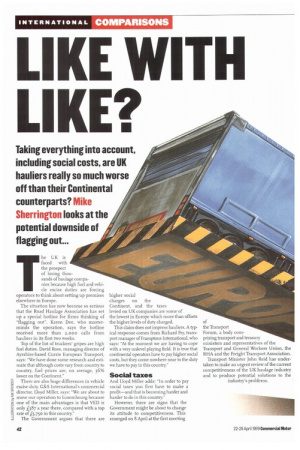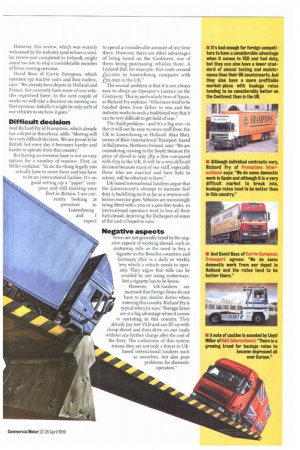LI KE WITH LI KE?
Page 44

Page 45

If you've noticed an error in this article please click here to report it so we can fix it.
Taking everything into account, including social costs, are UK hauliers really so much worse off than their Continental
counterparts? Mike Sherrington looks at the
potential downside of flagging out...
The UK is faced with the prospect of losing thousands of haulage companies because high fuel and vehicle excise duties are forcing operators to think about setting up premises elsewhere in Europe.
The situation has now become so serious that the Road Haulage Association has set up a special hotline for firms thinking of "flagging out". Karen Dee, who masterminds the operation, says the hotline received more than 2,000 calls from hauliers in its first two weeks.
Top of the list of truckers' gripes are high fuel duties. David Ross, managing director of Ayrshire-based Currie European Transport, says: "We have done some research and estimate that although costs vary from country to country, fuel prices are, on average, 36% lower on the Continent."
There are also huge differences in vehicle excise duty. G&S International's commercial director, Lloyd Miller, says: "We are about to move our operation to Luxembourg because one of the main advantages is that VED is only £387 a year there, compared with a top rate of 5,75o in this country."
The Government argues that there are higher social charges on the Continent, and the taxes levied on UK companies are some of the lowest in Europe which more than offsets the higher levels of duty charged.
This claim does not impress hauliers. A typical response comes from Richard Fry, transport manager of Framptons International, who says: "At the moment we are having to cope with a very unlevel playing field. It is true that continental operators have to pay higher social costs, but they come nowhere near to the duty we have to pay in this country."
Social taxes
And Lloyd Miller adds: "In order to pay social taxes you first have to make a profit—and that is becoming harder and harder to do in this country."
However, there are signs that the Government might be about to change its attitude to competitiveness. This emerged on 8 April at the first meeting of the Transport Forum, a body comprising transport and treasury ministers and representatives of the Transport and General Workers Union, the RI-IA and the Freight Transport Association.
Transport Minister John Reid has undertaken to make an urgent review of the current competitiveness of the UK haulage industry and to produce potential solutions to the
industry's problems. • However, this review, which was warmly welcomed by the industry (and echoes a similar review just completed in Ireland), might come too late to stop a considerable number of firms moving overseas.
David Ross of Currie European, which operates 150 tractive units and 8o o trailers, says: "We already have depots in Holland and France, but currently have none of our vehicles registered there. In the next couple of weeks we will take a decision on moving our fleet overseas. Initially it might be only zo% of our vehicles to see how it goes."
Difficult decision
And Richard Fry of Framptons, which already has a depot in Barcelona, adds: "Moving will be a very difficult decision. We are proud to be British but every day it becomes harder and harder to operate from this country" But having an overseas base is not an easy option, for a number of reasons. First, as Miller explains: "To do the thing legally you actually have to move there and you have to be an international haulier. It's no good setting up a "paper" company and still running your fleet in Britain. I am currently looking at premises in Luxembourg and expect to spend a considerable amount of my time there. However, there are other advantages of being based on the Continent, one of them being purchasing vehicles there. A Leyland Daf, for example, that costs around £52,000 in Luxembourg compares with £70,000 in the UK."
The second problem is that it is not always easy to obtain an Operator's Licence on the Continent. This is particularly true of Spain, as Richard Fry explains: "0-licences tend to be handed down from father to son and the industry works in such a traditional way that it can be very difficult to get hold of one."
The third problem—and it's a big one—is that it will not be easy to move staff from the UK to Luxembourg or Holland. Alan Blair, owner of Blair International Transport, based in Ballymena, Northern Ireland, says: "We are considering moving to the South because the price of diesel is only 38p a litre compared with 67p in the UK. It will be a very difficult decision because many of our staff, especially those who are married and have kids in school, will be reluctant to leave."
UK-based international hauliers argue that the Government's attempt to increase fuel duty is backfiring on it as far as a revenue collection exercise goes. Vehicles are increasingly being fitted with moo or 1,400-litre tanks, so international operators tend to buy all their fuel abroad, depriving the Exchequer of some of the cash it hoped to raise.
Negative aspects
hruis are not generally tazed by the negative aspects of working abroad, such as motorway tolls or the need to buy a vignette in the Benelux countries and Germany (this is a daily or weekly levy which a vehicle needs to operate). They argue that tolls can be avoided by not using motorways, but a vignette has to be borne. However, UK hauliers are incensed that foreign firms do not have to pay similar duties when entering this country, Richard Fry is typical when he says: "Foreign firms are at a big advantage when it comes to operating in this country. They already pay low VED and can fill up with cheap diesel and then drive on our roads without any further charge after the cost of the ferry. The unfairness of this system means they are not only a threat to UKbased international hauliers such as ourselves, but also pose problems for domestic operators."








































































































